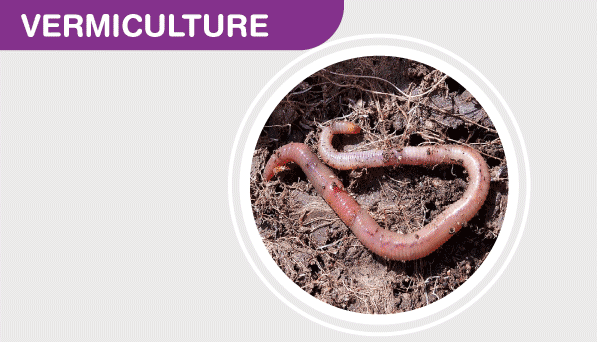Small-scale farmers play a vital role in providing communities with fresh, locally sourced produce. However, these farmers often face challenges related to limited resources, access to expensive fertilizers, and the disposal of organic waste. Fortunately, vermicomposting offers an affordable and eco-friendly solution to many of these issues.
What is Vermicomposting?
Vermicomposting is a process that utilizes earthworms to break down organic matter, transforming it into nutrient-rich compost known as vermicompost or worm castings. Small-scale farmers can set up vermicomposting systems easily and inexpensively, making it an attractive option for those with limited resources.
Benefits of Vermicomposting for Small-Scale Farmers
Reduced Organic Waste
One of the most significant advantages of vermicomposting is its ability to reduce organic waste. Small-scale farmers often generate a substantial amount of agricultural and kitchen waste, including crop residues and food scraps. Vermicomposting allows farmers to divert these materials away from landfills and convert them into valuable compost for their crops.
Nutrient-Rich Soil Amendment
Vermicompost is a potent organic fertilizer rich in essential nutrients like nitrogen, phosphorus, and potassium. It also contains beneficial microorganisms that improve soil structure and enhance nutrient availability for plants. Small-scale farmers can use vermicompost to replenish and enrich their soil, leading to healthier and more productive crops.
Improved Soil Structure
Healthy soil is the foundation of successful farming. Vermicompost helps improve soil structure by increasing its water-holding capacity, aeration, and overall fertility. This enhanced soil structure allows small-scale farmers to better retain moisture and nutrients, reducing the need for excessive irrigation and chemical fertilizers.
Reduced Chemical Dependency
Many small-scale farmers face the challenge of affording chemical fertilizers and pesticides. Vermicompost offers a natural alternative that reduces dependency on these expensive and potentially harmful inputs. By enriching the soil with organic matter, vermicomposting can enhance plant resistance to pests and diseases, reducing the need for chemical interventions.
Cost-Effective
Vermicomposting is a cost-effective method for small-scale farmers. Setting up a vermicomposting system requires minimal investment in equipment and can be done using locally available materials. Once established, the system generates a continuous supply of nutrient-rich compost at little to no ongoing cost.
Sustainable Farming Practices
Small-scale farmers often operate in close-knit communities where sustainable and environmentally friendly practices are highly valued. Vermicomposting aligns with these principles by reducing waste, conserving resources, and promoting a circular economy. Farmers who adopt vermicomposting can showcase their commitment to sustainable farming.
Enhanced Crop Yields and Quality
Vermicompost has been shown to increase crop yields and improve the quality of harvested produce. The nutrients and beneficial microorganisms in vermicompost promote vigorous plant growth and boost the nutritional content of fruits and vegetables. This can lead to higher market prices and greater economic returns for small-scale farmers.
Getting Started with Vermicomposting
Implementing vermicomposting on a small-scale farm is relatively straightforward. Here are some basic steps to get started:
Select a Suitable Location: Choose a well-ventilated and shaded area for your vermicomposting system. It could be in a corner of your farm or even a covered space.
Acquire Earthworms: Purchase red wigglers or Eisenia fetida earthworms, which are well-suited for vermicomposting. You can often source them locally or through online suppliers.
Set Up Containers: Use containers such as wooden crates, plastic bins, or even recycled barrels to create your vermicomposting bins. Ensure they have drainage holes at the bottom.
Add Bedding Material: Place a layer of bedding material, such as shredded newspaper or cardboard, at the bottom of the bin. This provides a comfortable environment for the earthworms.
Feed the Worms: Add kitchen scraps, crop residues, and other organic waste to the bin regularly. Be sure not to overfeed, as it can lead to odor issues and slow decomposition.
Maintain Moisture Levels: Keep the bedding moist but not waterlogged. Sprinkle water when needed to maintain proper moisture levels.
Harvest the Vermicompost: As the earthworms break down the organic matter, they leave behind nutrient-rich vermicompost. Harvest it when it’s dark, crumbly, and has a rich, earthy smell. Use it to amend your soil.
Conclusion
Vermicomposting is a sustainable and cost-effective solution for small-scale farmers looking to enhance soil fertility, reduce waste, and improve crop yields. By harnessing the power of earthworms, farmers can turn organic waste into a valuable resource for their agricultural endeavors. As small-scale farming continues to play a crucial role in local food systems, vermicomposting offers a pathway to more sustainable and prosperous farming practices. By adopting vermicomposting, small-scale farmers can reap the benefits of healthier soils, increased crop productivity, and a reduced environmental footprint. It’s a win-win for both farmers and the planet.





